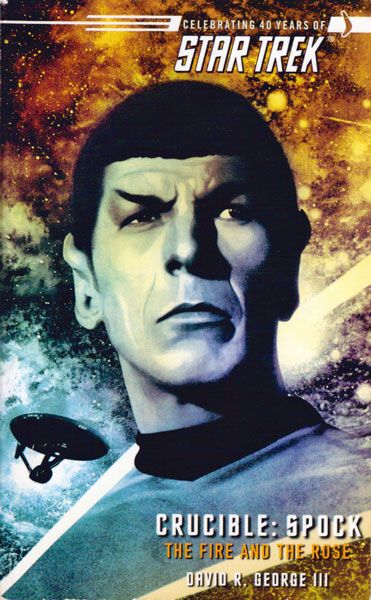
"Spock- The Fire And The Rose" follows the same basic formula as the McCoy novel; The author takes us on a journey through Spock's life, tying events and decisions to the trip through time he shared with Kirk and McCoy in "The City On The Edge Of Forever". David R. George III again does a fantastic job of giving new life and underlying meaning to scenes from the original series and movies that we've all seen countless times over the years. Along the way, he forces you to question certain decisions that we witnessed Spock make throughout the years, causing the reader to reexamine a character that we all probably felt we had a pretty good handle on by now. Multiple times throughout the book I found myself thinking "oh yeah... why did Spock do that when he didn't do that before?". What's great about the book though is that George then answers those questions quite adeptly, almost to the point that you feel it was planned his way all along. He fills in gaps in logic that I hadn't even realized had gaps to fill.
Now that's not to say that this book is flawless. I felt a large portion of the book was handled very well, in particular the moments expanded from "The City On the Edge Of Forever". There were, however, a few aspects that I found myself questioning. For instance (and be warned that these next few lines are somewhat spoilery), Spock deciding to attempt the Kolinahr for a second time after learning of Kirk's death on the Enterprise-B seemed wrong to me. The films did a fantastic job of bringing balance to Spock's character. He was finally able to find balance between his vulcan and human halves. For Spock to then attempt the Kolinahr again to erase his human half out of grief just seems to negate all of that. Even worse, Spock later decides that the Kolinahr was the wrong choice and then has to go through ritual of reestablishing his emotions... which once again leaves us to question if Spock actually did achieve his balance in the films, or if he was simply going through a period of indecisiveness.
Overall though, I was quite pleased with the book. Is it as good as "Crucible: McCoy"? Not in my opinion, but man... that is one tough act to follow. That's the problem with starting off SO strong in a trilogy- Everyone expects your sequel to be as good or better than your first outing. Had I read this Spock novel first, I'm sure that I would have been blown away by the story and how George handled the character's history... It's just in comparison to the McCoy novel that this one shows its slight shortcomings. "Crucible: Spock" is still an incredible read and worthy of a spot on your Trek bookshelf. Now I just hope the author finishes strong with the Kirk-centric finale...






I completely agree with your criticism of the book but it was a fatal flaw as far as my enjoyment of it was concerned. Spock's rejection of his emotion (again) after seeing him work over the course of six films to become the balanced character we last saw onscreen seemed completely false and totally contrived. It was a disservice to the character and it *totally* took me out of the book. I had much the same problem with Spock's appearances on TNG and the backstory that he had become estranged from his father AGAIN. Not logical, not believable, and a slap in the face to the resolution of one of my favorite episodes, "Journey to Babel".
ReplyDelete